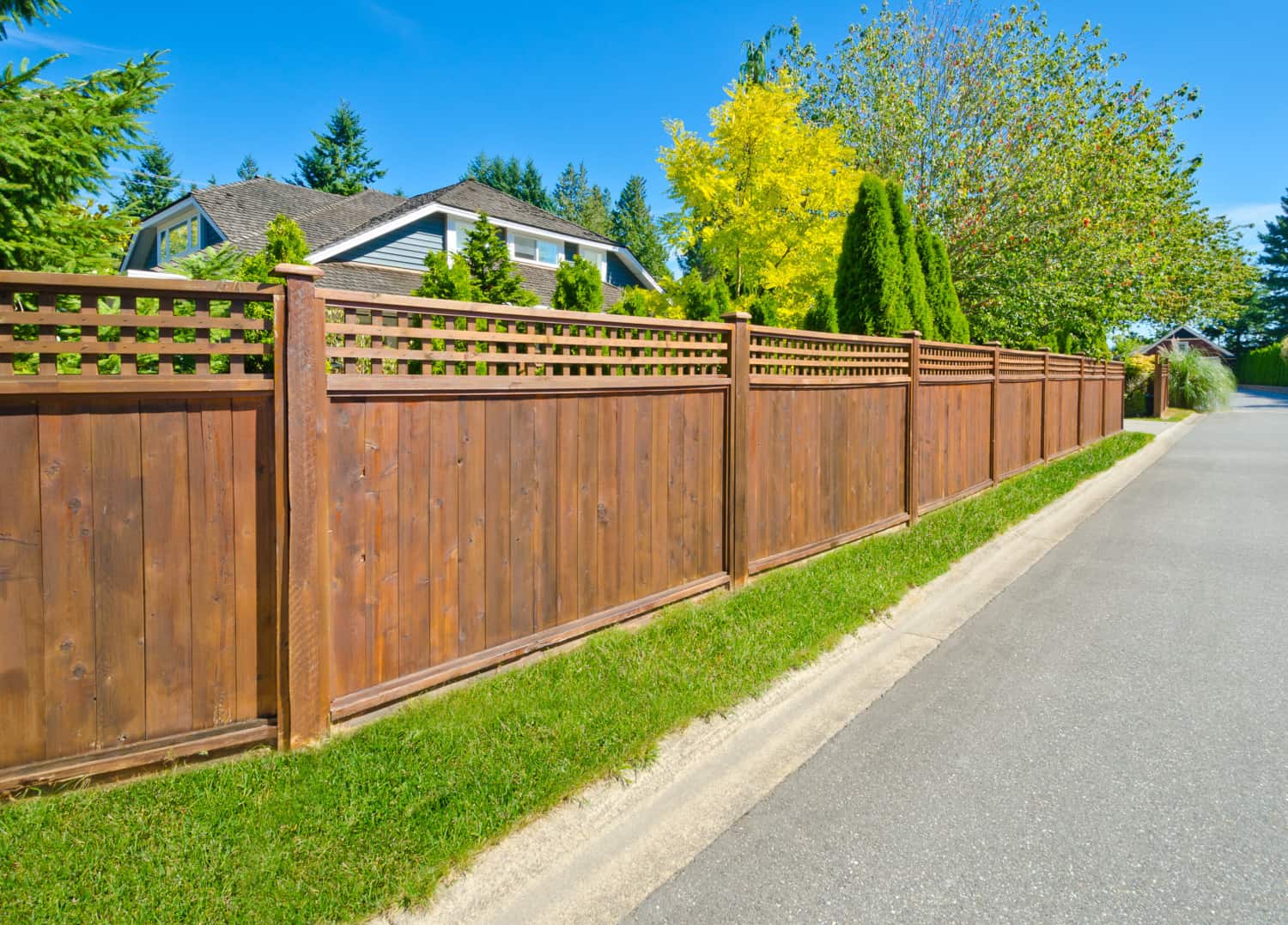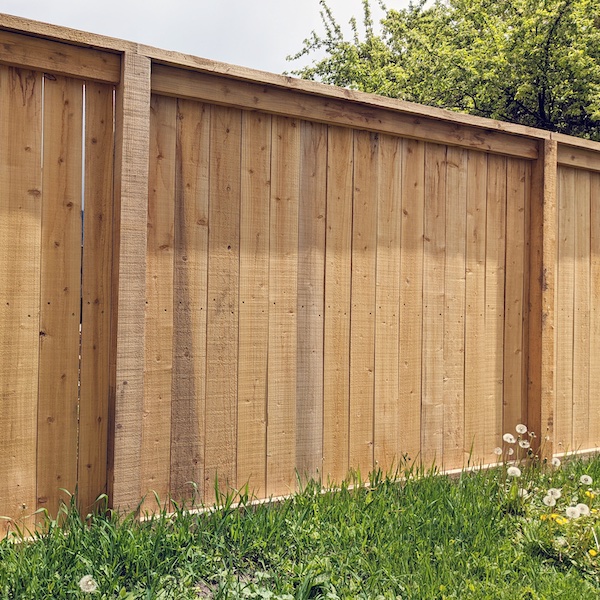Featured
When it comes to safeguarding and improving your building, picking the ideal secure fencing product is a vital decision. In this detailed overview, we'll discover the most prominent secure fencing materials to aid you make an educated option.
Advantages:
Natural aesthetic. High customization (stains, paints) When built tall), excellent privacy (. Relatively budget friendly. Downsides:
Needs regular maintenance (painting or staining) Prone to weather damages, pests, and rot. Shorter life expectancy compared to other materials. Best For: Homeowners looking for a warm, conventional appearance with high modification potential.
Benefits:
![]()
Reduced maintenance (no paint or discoloration) Resistant to weather, rot, and parasites. Durable (can last as much as three decades or even more) Range of shades and designs. Downsides:
First price can be greater than timber. Can fracture or damage in extreme climate condition (such as heavy impact) Minimal modification (contrasted to timber) Best For: Businesses and homeowners seeking a low-maintenance, resilient, and lasting fencing solution.
Benefits:
Extremely durable and secure. Reduced maintenance (especially aluminum) Visual charm (especially wrought iron) Great for high-security locations. Disadvantages:
Can be costly (particularly wrought iron and steel) Not as exclusive (unless combined with various other materials) Can corrosion (iron and steel require safety coverings) Best For: Property owners and businesses that need extra safety and security, or those trying to find a high-end, classic style.
Benefits:
Inexpensive and easy to install. Reduced maintenance. Gives safe boundaries. Suitable for big residential or commercial properties or pet dog units. Negative Aspects:
Supplies minimal personal privacy and appearance (unless incorporated with slats or covers) Can be seen as unattractive in particular setups. Prone to corrosion otherwise treated. Best For: Huge homes, protection fences, or areas where budget is a top priority over appearances.
Benefits:
![]()
Reduced upkeep (no staining or sealing called for) Resistant to fading, rot, and bugs. Strong and durable. Visual appeal similar to timber. Negative Aspects:
Higher first expense compared to timber. Limited modification options (contrasted to all-natural timber) Can end up being weak in extreme cool temperature levels. Best For: Homeowners that want the appearance of wood yet with a much more resilient and low-maintenance option.
Benefits:
Extremely durable and safe and secure. Reduced maintenance. Offers remarkable personal privacy and soundproofing. Includes worth to your residential or commercial property. Disadvantages:
High preliminary expense. Labor-intensive installment. Restricted style selection (even more standard styles) Best For: Premium homes or organizations calling for a long lasting, safe, and stylish fencing.
Benefits:
Eco-friendly and eco-friendly. Unique and aesthetically pleasing. Easy and light-weight to mount. Can be used as an attractive component. Negative Aspects:
![]()
Prone to weathering and damage over time (unless dealt with) Needs routine upkeep to prevent rotting or splitting. Much less protected than steel, stone, or wood. Best For: Eco-conscious property owners searching for a stylish and natural fence service.
Exactly How to Choose the Right Material. When choosing the finest secure fencing product for your residential or commercial property, take into consideration the list below variables:
Budget plan: Some products like wood and chain web link are a lot more budget-friendly, while others, like stone and functioned iron, are extra pricey. Upkeep: If you're searching for a low-maintenance alternative, plastic, metal, or composite products are superb choices. Purpose: Think about whether your key demand is security, personal privacy, or aesthetic appeals. For metal, chain or security web link fencings might be best, while timber or plastic might match those seeking privacy. Visual Preferences: The material you choose ought to enhance the layout and design of your home. Wood offers a rustic beauty, while steel and stone supply an even more contemporary or formal look. Toughness: Some materials, like plastic and steel, offer durable sturdiness, while others, like timber, may call for even more maintenance in time. Conclusion. Choosing the ideal fencing material is a necessary decision that influences your residential or commercial property's security, privacy, and visual allure. With a variety of choices available, from all-natural wood to low-maintenance vinyl and durable steel, it is very important to weigh each material's advantages and downsides based upon your certain requirements and choices. Whether you are searching for a useful limit or an ornamental addition, this guide will aid you make the most effective selection for your residential or commercial property.
- Wood Secure fencing. Wood fences are a flexible and classic option that provides natural beauty and personal privacy. They can be found in numerous styles, including picket, privacy, and post-and-rail, making them adaptable to various home types and choices. Wood uses a typical, rustic beauty, suitable for residential setups, and is simple to customize with paint or spots.
Advantages:
Natural aesthetic. High customization (stains, paints) When built tall), excellent privacy (. Relatively budget friendly. Downsides:
Needs regular maintenance (painting or staining) Prone to weather damages, pests, and rot. Shorter life expectancy compared to other materials. Best For: Homeowners looking for a warm, conventional appearance with high modification potential.
- Vinyl (PVC) Secure Fencing. Plastic fencings are becoming increasingly prominent as a result of their durability and reduced upkeep demands. Made from synthetic products, plastic fencings are immune to weather, bugs, and degeneration. They provide the look of timber yet without the upkeep, making them a wonderful alternative for both property and business properties.
Benefits:

Reduced maintenance (no paint or discoloration) Resistant to weather, rot, and parasites. Durable (can last as much as three decades or even more) Range of shades and designs. Downsides:
First price can be greater than timber. Can fracture or damage in extreme climate condition (such as heavy impact) Minimal modification (contrasted to timber) Best For: Businesses and homeowners seeking a low-maintenance, resilient, and lasting fencing solution.
- Steel Fence (Aluminum, Steel, Wrought Iron) Metal fencings are preferred for their toughness, safety and security, and ageless style. Light weight aluminum and functioned iron fences supply an innovative, high end look, commonly made use of for ornamental objectives, while steel fences are selected for their robust protection attributes.
Benefits:
Extremely durable and secure. Reduced maintenance (especially aluminum) Visual charm (especially wrought iron) Great for high-security locations. Disadvantages:
Can be costly (particularly wrought iron and steel) Not as exclusive (unless combined with various other materials) Can corrosion (iron and steel require safety coverings) Best For: Property owners and businesses that need extra safety and security, or those trying to find a high-end, classic style.
- Chain Web Link Secure Fencing. Wire mesh fence are a affordable and functional option, especially for big residential or commercial properties or locations calling for straightforward, useful borders. They are widely utilized in both residential and industrial settings and can be incorporated with privacy slats for added seclusion.
Benefits:
Inexpensive and easy to install. Reduced maintenance. Gives safe boundaries. Suitable for big residential or commercial properties or pet dog units. Negative Aspects:
Supplies minimal personal privacy and appearance (unless incorporated with slats or covers) Can be seen as unattractive in particular setups. Prone to corrosion otherwise treated. Best For: Huge homes, protection fences, or areas where budget is a top priority over appearances.
- Compound Fencing. Compound fencings combine timber fibers and plastic to create a material that is both low and strong upkeep. They supply the look of wood with the longevity of plastic and are offered in numerous shades and structures.
Benefits:

Reduced upkeep (no staining or sealing called for) Resistant to fading, rot, and bugs. Strong and durable. Visual appeal similar to timber. Negative Aspects:
Higher first expense compared to timber. Limited modification options (contrasted to all-natural timber) Can end up being weak in extreme cool temperature levels. Best For: Homeowners that want the appearance of wood yet with a much more resilient and low-maintenance option.
- Rock and Brick Secure Fencing. Rock and brick fences are superb for those seeking maximum longevity and a high-end visual. These fences offer unparalleled security, privacy, and longevity, making them excellent for distinguished buildings or industrial structures that require a robust obstacle.
Benefits:
Extremely durable and safe and secure. Reduced maintenance. Offers remarkable personal privacy and soundproofing. Includes worth to your residential or commercial property. Disadvantages:
High preliminary expense. Labor-intensive installment. Restricted style selection (even more standard styles) Best For: Premium homes or organizations calling for a long lasting, safe, and stylish fencing.
- Bamboo Secure fencing. Bamboo is an eco-friendly alternative that offers an all-natural, rustic look while supplying moderate security and personal privacy. It's coming to be a favorite for eco-conscious property owners that choose an even more sustainable material.
Benefits:
Eco-friendly and eco-friendly. Unique and aesthetically pleasing. Easy and light-weight to mount. Can be used as an attractive component. Negative Aspects:

Prone to weathering and damage over time (unless dealt with) Needs routine upkeep to prevent rotting or splitting. Much less protected than steel, stone, or wood. Best For: Eco-conscious property owners searching for a stylish and natural fence service.
Exactly How to Choose the Right Material. When choosing the finest secure fencing product for your residential or commercial property, take into consideration the list below variables:
Budget plan: Some products like wood and chain web link are a lot more budget-friendly, while others, like stone and functioned iron, are extra pricey. Upkeep: If you're searching for a low-maintenance alternative, plastic, metal, or composite products are superb choices. Purpose: Think about whether your key demand is security, personal privacy, or aesthetic appeals. For metal, chain or security web link fencings might be best, while timber or plastic might match those seeking privacy. Visual Preferences: The material you choose ought to enhance the layout and design of your home. Wood offers a rustic beauty, while steel and stone supply an even more contemporary or formal look. Toughness: Some materials, like plastic and steel, offer durable sturdiness, while others, like timber, may call for even more maintenance in time. Conclusion. Choosing the ideal fencing material is a necessary decision that influences your residential or commercial property's security, privacy, and visual allure. With a variety of choices available, from all-natural wood to low-maintenance vinyl and durable steel, it is very important to weigh each material's advantages and downsides based upon your certain requirements and choices. Whether you are searching for a useful limit or an ornamental addition, this guide will aid you make the most effective selection for your residential or commercial property.
Latest Posts
Just How to Choose the Right Furniture for a Tiny Living Area
Published Jan 20, 25
0 min read
Exactly How Does the Store Manage Furniture Delivery and Assembly Solutions?
Published Jan 20, 25
0 min read
Elevate Your Bathroom with Bath Fitter
Published Jan 20, 25
1 min read